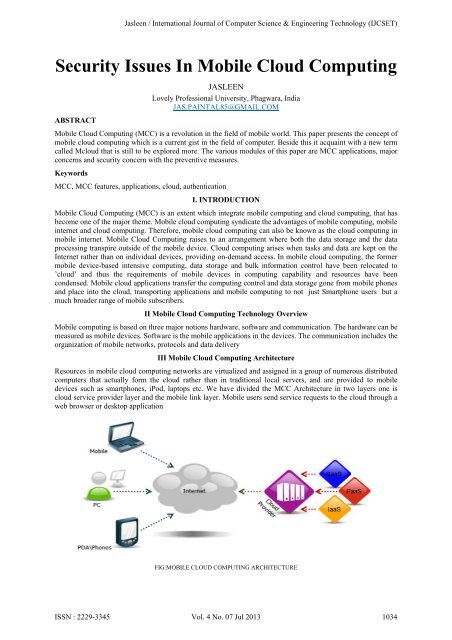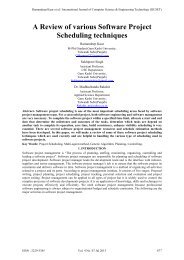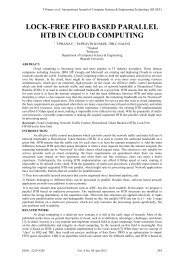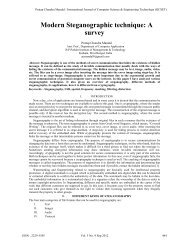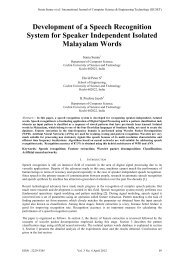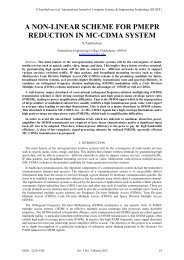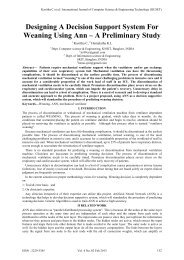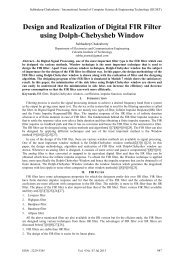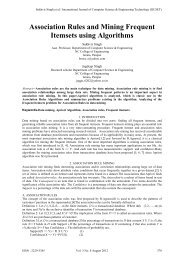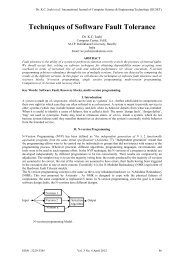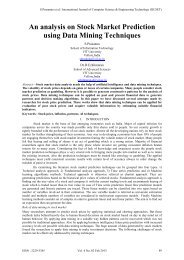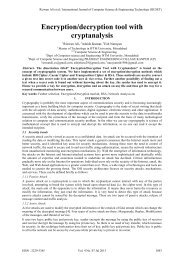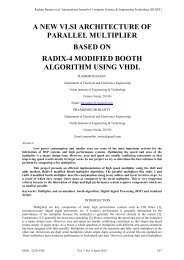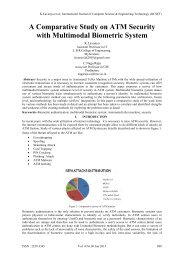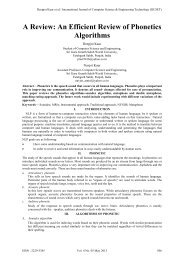Security Issues In Mobile Cloud Computing - IJCSET
Security Issues In Mobile Cloud Computing - IJCSET
Security Issues In Mobile Cloud Computing - IJCSET
Create successful ePaper yourself
Turn your PDF publications into a flip-book with our unique Google optimized e-Paper software.
Jasleen / <strong>In</strong>ternational Journal of Computer Science & Engineering Technology (<strong>IJCSET</strong>)<strong>Security</strong> <strong>Issues</strong> <strong>In</strong> <strong>Mobile</strong> <strong>Cloud</strong> <strong>Computing</strong>JASLEENLovely Professional University, Phagwara, <strong>In</strong>diaJAS.PAINTAL85@GMAIL.COMABSTRACT<strong>Mobile</strong> <strong>Cloud</strong> <strong>Computing</strong> (MCC) is a revolution in the field of mobile world. This paper presents the concept ofmobile cloud computing which is a current gist in the field of computer. Beside this it acquaint with a new termcalled Mcloud that is still to be explored more. The various modules of this paper are MCC applications, majorconcerns and security concern with the preventive measures.KeywordsMCC, MCC features, applications, cloud, authenticationI. INTRODUCTION<strong>Mobile</strong> <strong>Cloud</strong> <strong>Computing</strong> (MCC) is an extent which integrate mobile computing and cloud computing, that hasbecome one of the major theme. <strong>Mobile</strong> cloud computing syndicate the advantages of mobile computing, mobileinternet and cloud computing. Therefore, mobile cloud computing can also be known as the cloud computing inmobile internet. <strong>Mobile</strong> <strong>Cloud</strong> <strong>Computing</strong> raises to an arrangement where both the data storage and the dataprocessing transpire outside of the mobile device. <strong>Cloud</strong> computing arises when tasks and data are kept on the<strong>In</strong>ternet rather than on individual devices, providing on-demand access. <strong>In</strong> mobile cloud computing, the formermobile device-based intensive computing, data storage and bulk information control have been relocated to’cloud’ and thus the requirements of mobile devices in computing capability and resources have beencondensed. <strong>Mobile</strong> cloud applications transfer the computing control and data storage gone from mobile phonesand place into the cloud, transporting applications and mobile computing to not just Smartphone users but amuch broader range of mobile subscribers.II <strong>Mobile</strong> <strong>Cloud</strong> <strong>Computing</strong> Technology Overview<strong>Mobile</strong> computing is based on three major notions hardware, software and communication. The hardware can bemeasured as mobile devices. Software is the mobile applications in the devices. The communication includes theorganization of mobile networks, protocols and data deliveryIII <strong>Mobile</strong> <strong>Cloud</strong> <strong>Computing</strong> ArchitectureResources in mobile cloud computing networks are virtualized and assigned in a group of numerous distributedcomputers that actually form the cloud rather than in traditional local servers, and are provided to mobiledevices such as smartphones, iPod, laptops etc. We have divided the MCC Architecture in two layers one iscloud service provider layer and the mobile link layer. <strong>Mobile</strong> users send service requests to the cloud through aweb browser or desktop applicationFIG:MOBILE CLOUD COMPUTING ARCHITECTUREISSN : 2229-3345 Vol. 4 No. 07 Jul 2013 1034
Jasleen / <strong>In</strong>ternational Journal of Computer Science & Engineering Technology (<strong>IJCSET</strong>)IV Applications of <strong>Mobile</strong> <strong>Cloud</strong> <strong>Computing</strong>Some of the applications of mobile cloud computing are Google's Gmail drive, Maps and Navigation systemsfor <strong>Mobile</strong>, I- cloud from Apple Moto Blur from Motorola(with a special feature called remote wipe) Amazon ‘snew "cloud-accelerated" Web browser Silk. Silk is a "split browser whose software resides both on Kindle Fireand EC2. The applications reinforced by mobile cloud computing include mobile commerce, mobile learning,and mobile healthcare and other areas. <strong>Mobile</strong> applications extended extensive share in a global mobile market.Various mobile applications have engaged the recompenses of <strong>Mobile</strong> <strong>Cloud</strong> <strong>Computing</strong>. The following are thefew inferences:m-Commerce: <strong>Mobile</strong> commerce (m-commerce) is a buying and selling of products using mobile devices. Them-commerce applications normally used to achieve some tasks that necessitate mobility (e.g., mobiletransactions and payments, mobile messaging, and mobile ticketing). The m-commerce applications have to facevarious complications (e.g., low network bandwidth, high complexity of mobile device configurations, andsecurity). Subsequently, m-commerce applications are integrated into cloud computing environment to solvethese issues [1].m-Learning: <strong>Mobile</strong> learning (m-learning) is an electronic learning (e-learning) and mobility. However,traditional m-learning applications have limitations in terms of high cost of devices and network, low networktransmission rate, and limited educational resources [2, 3, 4]. <strong>Cloud</strong> based m-learning applications are presentedto solve these limitations, for example utilizing a cloud with the large storage capacity and powerful processingability, the applications offer learners with much comfortable services in terms of information size, processingspeed.m-HealthCare: MCC in medical applications is used to minimize the limitations of traditional medicaltreatment (e.g., small physical storage, security and privacy, and medical errors [5]). <strong>Mobile</strong> healthcare (mhealthcare)offers mobile users with appropriate help to access resources easily. m-Healthcare provideshealthcare organizations a diversity of on-demand services on clouds rather than standalone applications onlocal servers.m-BankingM-Banking is an uprising in traditional banking services, where user can avail the bank services provided tothem through their mobile despite of location and time [6]. Transaction can be done even if user is busy in hisroutine work via SMS or the mobile <strong>In</strong>ternet but can also use special programs, called mobile applications,downloaded to the mobile device.m-Game<strong>Mobile</strong> game (m-game) is a prospective market producing incomes for service providers. M-game cancompletely offload game engine requiring large computing resource (e.g., graphic rendering) to theserver in the cloud, and gamers only interact with the screen interface on their devices [7] demonstrates thatoffloading (multimedia code) can save energy for mobile devices, thereby increasing game playing time onmobile devices.V Benefits of mobile cloud computing<strong>Mobile</strong> <strong>Cloud</strong> <strong>Computing</strong> will help to upsurge the dispensation power and data storage of mobile devices. It alsomight help to increase the battery life by affecting the performance of commutation-intensive application ‘to thecloud’.<strong>Mobile</strong> <strong>Cloud</strong> <strong>Computing</strong> can upsurge security level for mobile devices attained by a unified monitoring andmaintenance of software.Its one-stop shopping option for users of mobile devices as <strong>Mobile</strong> <strong>Cloud</strong> Operators can act as virtual networkoperators, provide many e-services,A new technical functions might be given by mobile clouds. Storing data or running applications on clouds is anoperative way to improve the reliability.ISSN : 2229-3345 Vol. 4 No. 07 Jul 2013 1035
Jasleen / <strong>In</strong>ternational Journal of Computer Science & Engineering Technology (<strong>IJCSET</strong>)VI Major ConcernOur two major concern in MCC is Portability and interoperability which is impossible between different <strong>Cloud</strong><strong>Computing</strong> Service Providers, which handicaps the widely deploy and quick development of cloud computing.Portability- All mobile agent runs on a place on the virtual machines called <strong>Mobile</strong> Agent Place (MAP).<strong>Mobile</strong> agents carry the application code that move from one MAP to another MAP independent of the CCSP(<strong>Cloud</strong> <strong>Computing</strong> Service Provider) there by realizing portability among heterogeneous CCSPs<strong>In</strong>teroperability- <strong>In</strong>teroperability problem is condensed to the conciliation and association among agents whichcan be affected using agent interoperability standardsVII <strong>Mobile</strong> <strong>Cloud</strong> <strong>Computing</strong> <strong>Security</strong>The one of the key issues that most cloud providers are given attention is securing mobile cloud computing isuser’s privacy and integrity of data or applications. Subsequently mobile cloud computing is a combination ofmobile networks and cloud computing, the security related issues are classified into two categories:<strong>Mobile</strong> network user’s security<strong>Cloud</strong> security<strong>Mobile</strong> network security: Different mobile devices have numbers of security threats such as malicious codes.Some applications to these can cause privacy issues for mobile users .There are two main issues concerning themobile user security<strong>Mobile</strong> Application <strong>Security</strong>: - The easiest ways to check security problems is done by installing and runningsecurity software and antivirus on mobile devices. But since mobile devices are having limitation withprocessing and power, protecting them from these threats could be more difficult compared to regularcomputers. Several techniques have been introduced for transferring threat detection and security mechanisms tothe cloud. Before mobile users could use an application, it should go through some level of threat evaluation. Allfile activities that are done on mobile devices will be verified if it is malicious or not. <strong>In</strong>stead of running antivirussoftware or threat detection programs locally, mobile devices only performs lightweight activities such asexecution traces transmitted to cloud security servers.[8]Privacy: Revealing your private information such as giving geo location and user’s important <strong>In</strong>formation likedate of birth, Credit card information etc. creates situations for privacy issues. For example, use of GPS onmobile devices. <strong>In</strong>timidations for revealing private information could be reduced through selecting andanalysing the enterprise needs and require only specified services to be acquired and moved to the cloud [8]VIII Preventive Measures:The following are the preventive to secure information on cloud<strong>In</strong>tegrity: Every user must guarantee the integrity of their information stored on the cloud. Every access theymake must me valid and verified. Different methods in preserving veracity for one’s information that is storedon the cloud is being proposedAuthentication: Different authentication techniques have been accessible and projected using cloud computingto secure the data access suitable for mobile environments. Some uses the open standards and even provisionsthe integration of various authentication methods.Legal provisions: Distribution and piracy of digital contents such as video, image, audio, and e-book, programsshould be criticized. The solutions to protect these contents from illegal access are applied such as encryptionand decryption keys to access these contents.IX Conclusion<strong>Mobile</strong> <strong>Cloud</strong> <strong>Computing</strong> will give an environment for applications, providing an easy way for smallerdevelopers to secure their services. It proposes on-demand network access to a shared pool of configurablecomputing that can be rapidly provisioned and unconfined with minimal management effort or service providerinteraction. <strong>Mobile</strong> cloud computing is one of mobile technology trends in the future since it combines theadvantages of both mobile computing and cloud computing, hence providing optimum services for mobile users.This paper have discussed security issues concerning to mobile cloud computing. Securing mobile cloudcomputing user’s privacy and integrity of data or applications is one of the key issues most cloud providers aretaking care off. <strong>Mobile</strong> cloud computing is a amalgamation of mobile networks and cloud computing, thesecurity related issues are then divided into two categories: mobile network user’s security; and mobile cloudsecurityISSN : 2229-3345 Vol. 4 No. 07 Jul 2013 1036
Jasleen / <strong>In</strong>ternational Journal of Computer Science & Engineering Technology (<strong>IJCSET</strong>)References:[1] X. Yang, T. Pan, and J. Shen, “On 3G <strong>Mobile</strong> E-commerce Platform Based on <strong>Cloud</strong> <strong>Computing</strong>,” in Proceedings of the 3rd IEEE<strong>In</strong>ternational Conference on Ubi-Media <strong>Computing</strong> (U-Media), pp. 198 201, August 2010.[2] X. Chen, J. Liu*, J. Han, and H. Xu, “Primary Exploration of <strong>Mobile</strong> Learning Mode under a <strong>Cloud</strong> <strong>Computing</strong> Environment,” inProceedings of the <strong>In</strong>ternational Conference on E-Health Networking, Digital Ecosystems and Technologies (EDT), vol. 2, pp. 484 -487, June 2010.[3] H. Gao and Y. Zhai, “System Design of <strong>Cloud</strong> <strong>Computing</strong> Based on <strong>Mobile</strong> Learning,” in Proceedings of the 3rd <strong>In</strong>ternationalSymposium on Knowledge Acquisition and Modeling (KAM), pp. 293 - 242, November 2010.[4] Jian Li, “Study on the Development of <strong>Mobile</strong> Learning Promoted by <strong>Cloud</strong> <strong>Computing</strong>,” in Proceedings of the 2nd <strong>In</strong>ternationalConference on <strong>In</strong>formation Engineering and Computer Science (ICIECS), pp. 1, December 2010.[5] D. Kopec, M. H. Kabir, D. Reinharth, O. Rothschild, and J. A. Castiglione, “Human Errors in Medical Practice: SystematicClassification and Reduction with Automated <strong>In</strong>formation Systems,” Journal of Medical Systems, vol. 27, no. 4, pp. 297 - 313, August2003.[6] Jasleen, Jiteshwar, “<strong>Security</strong> <strong>Issues</strong> And Their Handling <strong>In</strong> m-Banking,” in proceedings of the national conference on Proceedings ofNational Conference on Recent Trends in <strong>In</strong>formation & Communication Technologies (RTICT-2013)), pp. 139-141, Feb 2013[7] Z. Li, C. Wang, and R. Xu, “Computation offloading to save energy on handheld devices: a Partition scheme,” in Proceedings of the2001 international conference on Compilers, architecture, and synthesis for embedded systems (CASES), pp. 238 - 246, November2001.[8] Soeung-Kon(Victor) Ko1), Jung-Hoon Lee2), Sung Woo Kim3),” <strong>Mobile</strong> <strong>Cloud</strong> <strong>Computing</strong> <strong>Security</strong> Considerations” Journal of<strong>Security</strong> EngineeringISSN : 2229-3345 Vol. 4 No. 07 Jul 2013 1037


